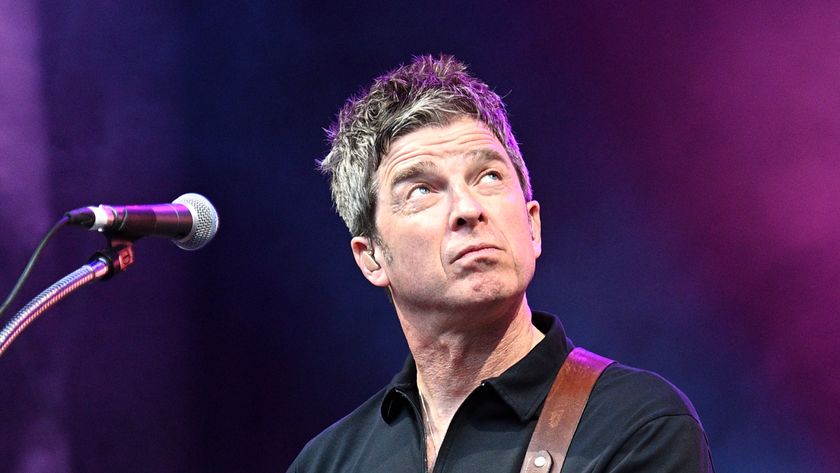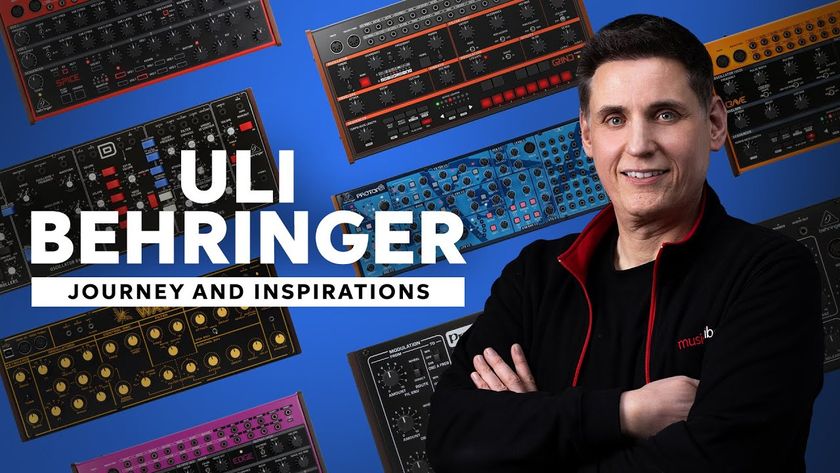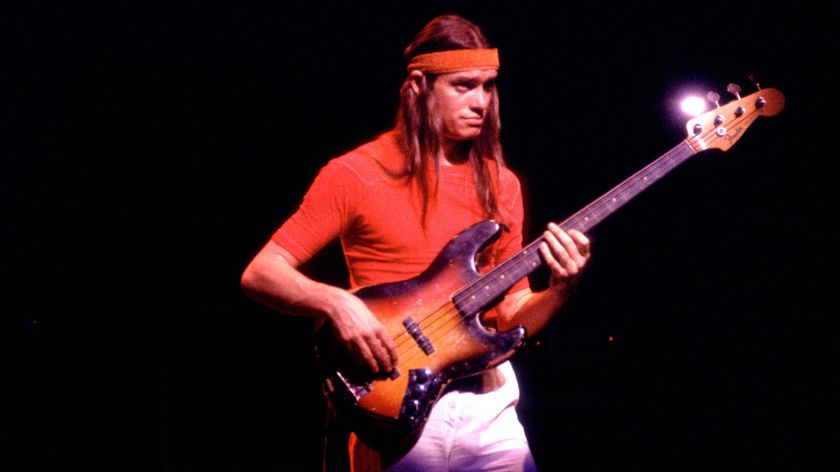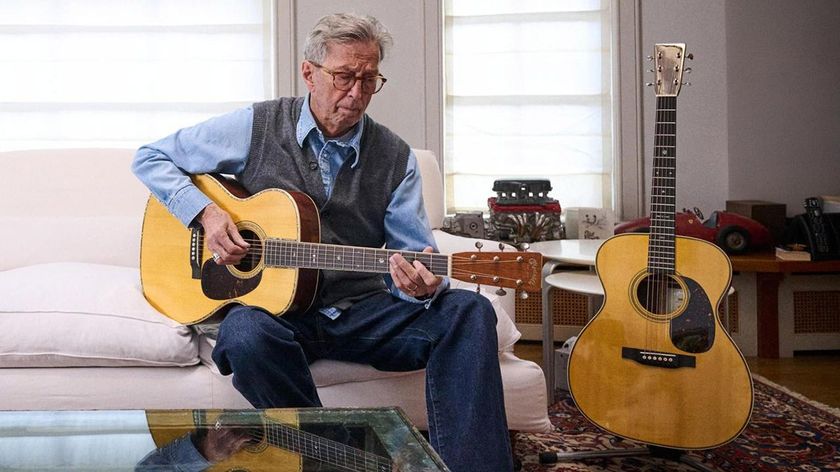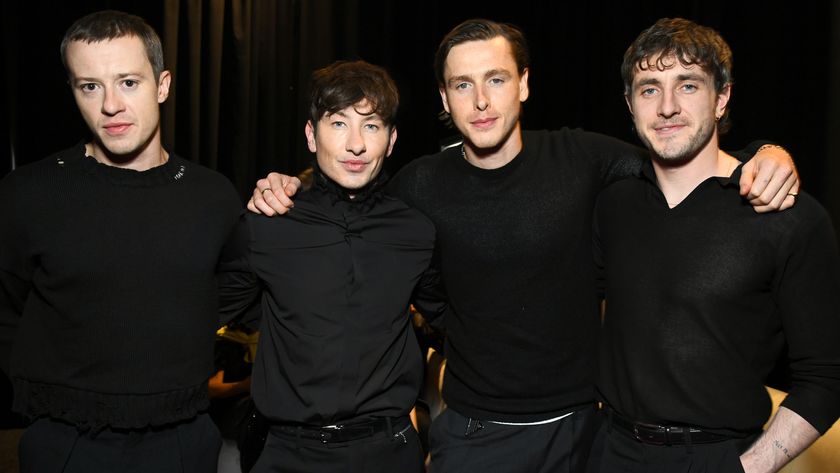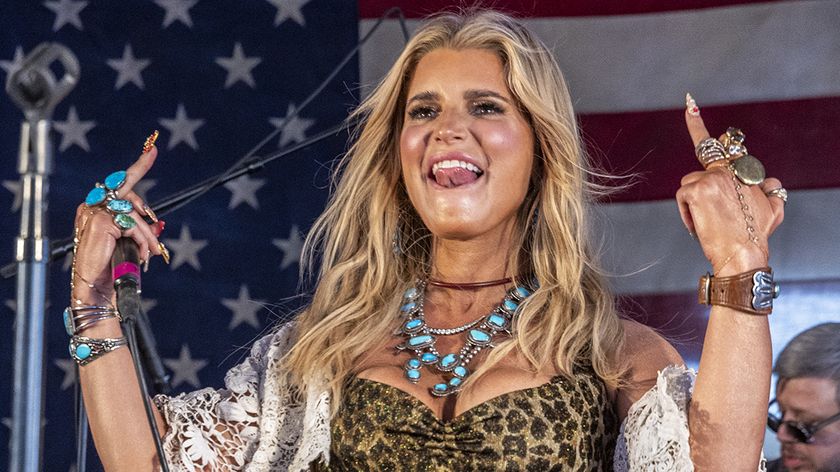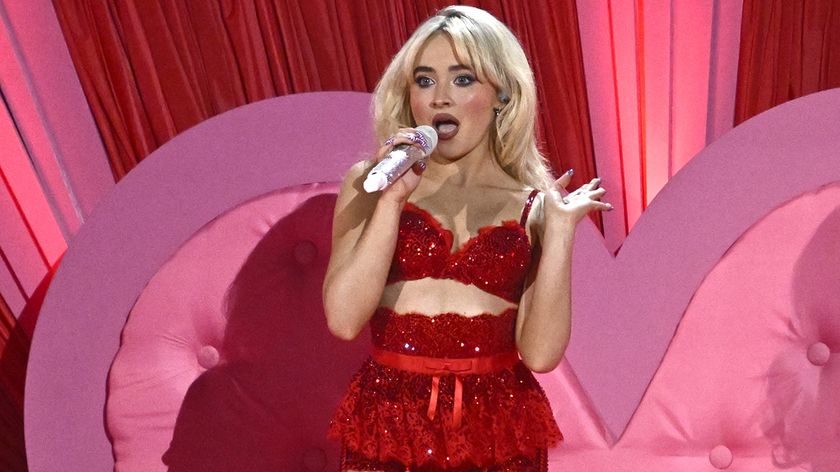
Will Lee picks 10 essential bass albums
For over 20 years, Will Lee has held down the bass slot in the CBS Orchestra on The Late Show With David Letterman (and before that, he spent 11 years with The World's Most Dangerous Band on Letterman's NBC show), an enviable, high-profile gig that has enabled him to trade licks with music's most esteemed talents.
Lee dialed up a number of his famous iPhone contacts when recording his recently released album, Love, Gratitude And Other Distractions, folks such as Steve Lukather, Pat Metheny, Billy Gibbons, Allen Toussaint, Leni Stern, drummers Steve Gadd and Peter Erskine, and, of course, Letterman Show musical director Paul Shaffer, all of whom jumped at the chance to be involved.
“What a great bunch of people!" Lee enthuses. "Whenever there was something that did call out for a specific player, I was lucky enough to have each one say yes right away. I have relationships with a lot of great people, and it was really cool that they were up for giving it a try. I'm very grateful for that."
Appreciation for blessings both great and small is the album's central theme, and Lee even titled the rapturous opening cut Gratitude. "I feel compelled to sort of drive home this sentiment," he explains. “Like most children, I thought there was no end in sight to life itself, so I took advantage of that by being a drug addict and an alcoholic. I never thought that far ahead, and in fact, I’m surprised I made it past 30. Something made me want to live, though, and I checked into rehab. I learned a lot of stuff there, a lot of life lessons that I never had. I replaced the drugs with growth and consciousness and, eventually, gratitude. And I was able to work the Serenity Prayer into the song. It’s gotten me through so many horrible situations."
Lee's reputation as one of the world's most versatile bassists (and busiest session men, with over 1,600 albums to his credit) might cause one to assume that Love, Gratitude And Other Distractions is a showcase for his four-string skills, but he's quick to shoot down that notion. "It's very much an album of songs, with singing and a lot of great people contributing," he says. "But I did know that there would be some expectations from me bass-wise, so I tried to include a couple of pieces that would appease that contingent, like Papounet's Ride, and I do a cover of Smile that's an instrumental bass performance. Hopefully, my fellow bass player friends out there will dig it."
And they might like to check out some of the records that Lee chose when he compiled his list of 10 Essential Bass Albums for MusicRadar, a diverse assortment that spans the gamut from adventurous jazz to groundbreaking pop.
“The bass can be something that perks up your ears," Lee says, "but once they’ve been perked, does it keep delivering year after year? If you keep coming back to a certain album, if the bass is still keeping those ears perked, then it’s a great bass album. There’s such a tremendous legacy of fantastic bass playing on so many records, so I’m probably leaving a bunch out. But here are ones that I just can’t deny.”
Love, Gratitude And Other Distractions can be purchased at Amazon. On the following pages, Will Lee runs down his picks for 10 Essential Bass Albums.

The Beatles - Sgt. Pepper's Lonely Hearts Club Band (1967)
“This is the record that ripped open the rock ‘n’ roll bass. It's a benchmark album in so many important ways, but particularly for Paul McCartney's bass playing, which is such a thing of beauty here. We're all still trying to hit even close to what he did on Sgt. Pepper – and you know, good luck to all of us! [Laughs]
Basically, it's the result of a guy who was very competitive, because Liverpudlians are very competitive by nature. Now, genius Liverpudlians hanging out with other genius Liverpudlians – hey, they take competition to a whole new level.
When you get a guy like Paul, who’s been this screamingly talented guitar player, and you get him on the bass on a song like With A Little Help From My Friends – which has very simple changes, by the way; it's not that it's overly complex, but of course, it's beautiful – he could probably just play the roots and it would be enough for most guys. But you get him in the studio when everybody else has gone home, and some other shit is going to go on. Stuff is going to change.
“Revolver is up there, too, but with Sgt. Pepper, there was so much put into those after-hours bass sessions. It’s Paul’s coming-out party as a bass player, and it’s simply spectacular.”

Miles Davis - Four & More (1966)
“There’s no better example of great ensemble playing than what Miles Davis’ quintet did when they recorded this live album. It was from a performance at the Philharmonic Hall of Lincoln Center in 1964, and it’s just incredible.
“It’s the epitome of guys flying through space together and turning on a dime with tempo and mood changes. Ron Carter is the bassist. There’s also Tony Williams on drums, Herbie Hancock on piano and George Coleman on tenor sax. There’s so much going on between those guys; everybody is taking turns soloing, it seems, at various times.
“The competition was huge in this band. Everybody was at the top of their game, and each guy was trying to get a rise out of the other guy. It’s fierce. And Miles – I remember this from the one time I played with him on Letterman – he wants you to play quietly, because he wants you to hear him. That’s the mentality they were dealing with.
“Bass players have to check out this record. If you dig it the first time you hear it, you’ll dig it even more the hundredth time.”

Roberta Flack - Chapter Two (1970)
“When I first came to New York, it was to join a band called Dreams. It featured both Michael and Randy Brecker, Billy Cobham on drums, Don Grolnick on keys and Bob Mann on guitar. These guys are giants in the New York music-making world.
“I was coming to replace another bass player, and lucky for me I’d never heard of the guy, ‘cause his name was Chuck Rainey. I came in from Miami, this cocky kid – ‘Sure, I’ll replace anybody. I’m that good!’ Had I known, I wouldn’t have come up. In this case, my ignorance was truly bliss in this situation.
“I ended up getting the gig, so I’m all secure – yeah, I’m a badass, blah blah blah. I’m staying at Michael Brecker’s house ‘cause I didn’t have my own apartment yet. He would listen to this station called WLIB – they played all the great soul music. So I’m in the kitchen listening to the radio. Mike’s in the other room practicing, which he does 24 hours a day; I’m eating, which I do 24 hours a day. This Roberta Flack song Reverend Lee comes on the radio, and it’s, like, all bass. It was unbelievable.
“I called out to Michael, and he said, ‘Oh, yeah, that’s Chuck... the guy you replaced.’ ‘What?!... What am I doing here?’ I never heard anything like what Chuck was doing. He was innovating, playing all of these harmonic things in the key of A that I’ve used on hundreds of tracks since, but at the time it was all new to me. I wanted to be a studio guy, and Chuck showed you what you could do and still not get fired.
“This song is off Roberta’s album Chapter Two, which I promptly bought. And after that, I would buy anything that had Chuck’s credit listed. I got everything. But it was that first song, Reverend Lee, that blows me away.”
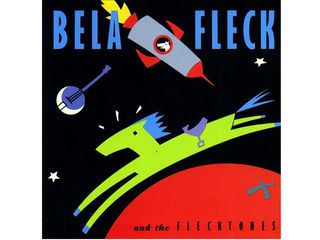
Bela Fleck And The Flecktones - Bela Fleck And The Flecktones (1990)
“I was in an airport making a connecting flight, and this guy comes up to me: ‘Hey, man, my name’s Bela Fleck. I’m a huge fan, and I want you to hear my CD.’ I’m like, ‘Yeah, yeah…’ I’m kind of distracted, you know? So he gave me his CD, which happened to have Victor Wooten on it. I listened to it and was like, ‘Are you kidding me? [Laughs] It was incredible.
“To me, Victor was the next Jaco. He opens up the bass and shows you what the possibilities are with this instrument. There’s so much music inside of him, it's like he can't edit anything he plays; he doesn't need to, really – it goes straight from his brain to the instrument.
“I’ve followed Victor since then, and he’s become a really, really good friend. This album was the wake-up call: ‘Pay attention, everyone! There’s a guy new in town.’”

Peter Gabriel - So (1986)
“It’s noteworthy for the bass playing, but as an album of great music, it’s superior to most other offerings. Tony Levin and Larry Klein play some of most incredible stuff. I’m not sure how Peter Gabriel goes about his recordings, but he chose the right guys for this music. They took the shit to the next level and beyond.
“The stuff isn’t complicated: The songs are simple, the grooves are fat, the ideas are unusual, and the bass parts are expertly handled with compressor pedals and a pick. There’s a percussive feel to the attack – you feel the bass notes in your chest. And they’re hooks, too, hooks and sub-hooks, great little lines and recurring thoughts that stay with you. I love the way it all pulls you in.”

Graham Central Station - Graham Central Station (1974)
“Larry Graham, man. As soon as this record came out, people started talking about it, and with good reason: It’s spectacular in every way, with so many incredible bass performances that all you can do is just sit there and feel jealous that you can’t play that well.
“Of course, I was already a huge Larry fan from the work he did with Sly And The Family Stone, but when he formed his own band, I got him as the full artist. We’ve Been Waiting is such a great opener, and then it goes into It Ain’t No Fun To Me, and it keeps right on delivering. A dynamite record.
“Larry is pure joy. He loves what he’s doing, he’s feeling it, and he just can’t wait to get it out to you. He’s the kind of guy who could be playing to one person or 10,000, and it’s all the same. That kind of spirit comes through on this album.”

Motown Greatest Hits (2003)
“You can talk about little guitar hooks or certain drumbeats, but in my mind, James Jamerson is the guy who defined Motown. If you took the bass out of the Motown picture, you’d get something skeletal, without the true grooves and story – the things that completed each song.
“The Motown studio guys were called in and probably given 50 bucks a tune. They could have just played downbeats and roots, and it would've sounded OK. But they took their time and explored each groove, and they found stuff that really worked.
“In the case of Jamerson, he found stuff on the four-string bass that wasn’t even on the four-string bass. He was famous for not only coming with sub-hooks, as I call them, but he also came up with completely new things each time, on each song. And he’d been playing all day – by the end of the night, he’d done about 10 tracks. He probably got better as the hours clicked by, which is crazy to think about. I don’t know where he was drawing all that from – I know he came from upright bass and jazz, like all those guys did. He was a genius."

Jaco Pastorius - Jaco Pastorius (1986)
“Not only was it amazing at the time, but it’s still kicking everybody’s ass. If you think you can play bass, you should listen to this record and then ask yourself, ‘Can I play bass at all?’
“From the opening cut, Donna Lee, Jaco grabs your ear and doesn’t let go, and everything he does after that is astounding in its own way. He opened up those four pieces of metal and that block of wood that we call the bass, and he showed you just what you could do with it.
“He was a really busy player, but he made it work because he was so musical and so creative.”

Oscar Peterson - The Trio (1961)
“Ray Brown is my favorite upright bass player. He made this album with the Oscar Peterson Trio, and it’s just one of the best things you could ever hear.
“Inside that trio, Ray has such a voice on the bass. He grooves and swings really hard, using every inch of that instrument and finding so many nuances in each sound. There’s something about how he plays harmonics that really captivates me. Also, he makes all of these little statements – they’re like hooks and sub-hooks all over the record.
“He tickles your fancy and your ear with his humor and, of course, his ridiculous prowess. He’s just the guy for me. I love how he digs in. There’s vitality and taste in everything he does.
“The record is also a good education in learning what to play and how to let the leader of the band shine. Ray and the other guy [Ed Thigpen] do stay out of Oscar’s way, as it should be. Oscar sounds like he’s playing piano from the inside out. His groove is insane, his facility is so great, and he has so much to say. You don’t want to compete with that. Ray strikes a balance and finds the perfect pocket all the time.”

The Who - Meaty Beaty Big And Bouncy (1971)
“Entwistle was no slouch when he played all of those incredible things. I don’t even know if he knew what he was doing half the time; he just seemed to be responding to what was happening. The music flowed from him so naturally.
“From the first I heard I Can’t Explain, which might be my favorite Who song, I was in awe of John Entwistle. He’s driving the music as much as Townshend’s big power chords. He sort of carries you along with an animalistic attitude. That’s the stuff that made me want to play rock ‘n’ roll music. And My Generation is ridiculous. The bass is all over that stuff, and it’s pure magic.
“One night I fell asleep with Happy Jack playing over and over again – I had one of those turntables that just kept repeating. The basslines on that song roll and groove and pop. John was like the unheralded star on so many Who songs. It would still be great music if he just laid back and didn't play as much, but put him on it – all that insane talent just exploding – and you’ve got masterpieces. It’s amazing that he didn’t move on stage because his parts were always so animated and playful.”

Joe is a freelance journalist who has, over the past few decades, interviewed hundreds of guitarists for Guitar World, Guitar Player, MusicRadar and Classic Rock. He is also a former editor of Guitar World, contributing writer for Guitar Aficionado and VP of A&R for Island Records. He’s an enthusiastic guitarist, but he’s nowhere near the likes of the people he interviews. Surprisingly, his skills are more suited to the drums. If you need a drummer for your Beatles tribute band, look him up.

"Reggae is more freeform than the blues. But more important, reggae is for everyone": Bob Marley and the Wailers' Catch a Fire, track-by-track

“Part of a beautiful American tradition”: A music theory expert explains the country roots of Beyoncé’s Texas Hold ‘Em, and why it also owes a debt to the blues

"Reggae is more freeform than the blues. But more important, reggae is for everyone": Bob Marley and the Wailers' Catch a Fire, track-by-track

“Part of a beautiful American tradition”: A music theory expert explains the country roots of Beyoncé’s Texas Hold ‘Em, and why it also owes a debt to the blues
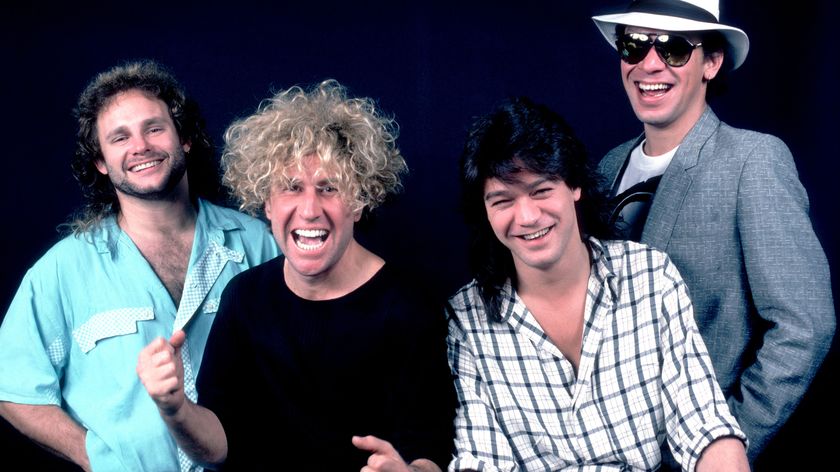
![Chris Hayes [left] wears a purple checked shirt and plays his 1957 Stratocaster in the studio; Michael J. Fox tears it up onstage as Marty McFly in the 1985 blockbuster Back To The Future.](https://cdn.mos.cms.futurecdn.net/nWZUSbFAwA6EqQdruLmXXh-840-80.jpg)
